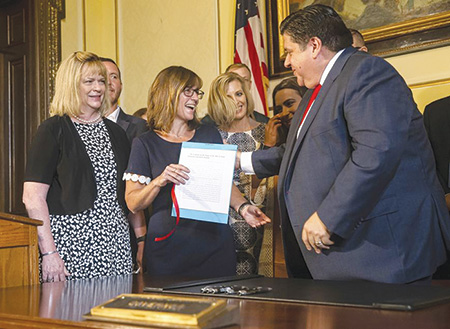By CARL GREEN
Illinois Correspondent

Springfield, IL – It’s a new day in the Land of Lincoln, where a pro-Labor governor and Democratic majority in the Illinois Legislature passed an unprecedented number of pro-worker bills this session that will change the state in ways big and small to improve the lives of working families.
Lawmakers sent Gov. J.B. Pritzker 599 bills this session, he vetoed seven, sent one back with an amendatory veto – and signed an astonishing 591 bills into law, many with the support of unions and workers.
Following is a partial list of the pro-worker bills that were passed.
THE BIG ITEMS
- Fight for $15 – The first accomplishment of the Legislature and Pritzker was to approve a 10-year overdue increase in the state’s minimum wage, starting with a raise of $1 to $9.25 next Jan. 1 and then increasing by stages to $15 by 2025. Pritzker said it will affect 1.4 million people.
- Capital bill – Rebuild Illinois is the first capital bill passed in 10 years, to generate $45 billion in much-needed infrastructure spending for roads, bridges, schools, state-owned buildings and more, approved by Democrats with some Republican support. It increases gasoline taxes by 19 cents and cigarettes by $1.
The Illinois AFL-CIO lobbied in favor of the plan. “Capital projects put thousands of people to work in every corner of our state while making much-needed investments to our aging infrastructure,” said its president, Michael Carrigan. - “Right-to-work (for less)” – Undoing some of former Governor Bruce Rauner’s shenanigans, the Legislature outlawed local “right-to-work” zones that he had sought in lieu of the statewide law he would have preferred. The Collective Bargaining Freedom Act refers to workers and employers being free to negotiate contract terms. The House vote was nearly unanimous.
- Horse tracks and gambling – Chicago-area unions strongly supported the plan to legalize sports gambling, add poker machines at Chicago airports and allow the state’s three horse-racing tracks to offer casino games and video gambling machines, long sought by Fairmount Park of Collinsville.
Six new casinos were authorized, in Chicago, Rockford, Waukegan, Danville, Williamson County (southern Illinois) and the south Chicago suburbs. That promises some construction work and will also help fund the capital improvement plan.
ON THE JOB
- Two-person rail crews – Freight trains passing through Illinois must have at least two crew members for safety purposes. Hoffman was chief sponsor in the House, and Manar, Crowe and Belt were Senate sponsors. Republicans opposed this.
- Prompt payment – Construction contractors may still “retain” up to 10 percent of payments to workers until completion, but after projects are half-done, the retainage may no longer exceed 5 percent. Bristow was a sponsor.
- Worker protection – The Attorney General’s office will create a Worker Protection Unit to combat businesses that “underpay their employees, force employees to work in unsafe conditions, and … avoid their tax and labor responsibilities.” The law also creates a Worker Protection Task Force of local and regional officials.
- Discrimination exemption – Employers with one or more employees – all of them, that is – will be subject to the Illinois Human Rights Act, no longer exempting those with up to 15 employees from prohibitions against discrimination based on race, color, religion and sex.
- Hotel and casino workers – Employers must adopt anti-sexual harassment policies and provide safety alert devices to employees. Passage was nearly unanimous, with most of the southern Illinois representatives co-sponsoring.
- Wage history – Potential employers may not ask a job candidate’s salary or wage history, nor use those histories to screen candidates.
- Fire fighter training – Fire fighter training must now include information about the history of the fire service labor movement, delivered by a union representative.
- Dangerous paper – Prohibits use of paper containing Bisphenol A for business and banking records, and requires the EPA to look into the least toxic alternatives. Passed by party line in the House, unanimously in the Senate.
A SEAT AT THE TABLE
- Regulatory boards – New laws require that specified numbers of union members or their representatives to be included on several influential state government commissions, among them the Miners Examining Board, Workers Compensation Commission, State Mining Board, Employment Security Advisory Board, Employment Security Board of Review and Workers Compensation Medical Fee Advisory Board.
- Firefighter advisory – Similarly, the governor must name at least one person from a registered apprenticeship program for installation and repair of fire extinguishing systems to the State Firefighter Advisory Committee.
TEACHERS AND EDUCATION
- Teacher pay – One of the season’s biggest issues was to bring the minimum public school teacher salary up to date from the current $10,000 to $32,076 in 2020-2021 and then in steps to $40,000 in 2023-24. Sponsors included Stuart, Hoffman, Greenwood and Manar.
“This $40,000 minimum salary legislation sends a message to future teachers that they are valued and respected in Illinois,” said Kathi Griffin, president of the Illinois Education Association. “This step is critical as we face growing teacher shortages, and it will allow us to attract and retain the very best teachers for our children.” - Teacher shortage – Manar’s bills to deal with the shortage of teachers will allow student teachers to be paid and cancel the basic skills test for teachers. They also make funding and incentives available to fill teaching jobs in rural areas.
- Teacher retirement – The Legislature ended a Rauner policy that forced school districts to pay a higher share of pensions of teachers who get raises of 3 percent or more in their last 10 years on the job, essentially prohibiting such raises even in cases of promotion or added duties. The new limit is six percent, the same as before Rauner. Teacher unions fought hard to end the three-percent rule.
- Charter schools – The Charter School Commission will be abolished Oct. 1, 2020, with its powers and assets turned over to the State Board of Education and local school boards, something the teachers’ unions strongly supported. The small opposition was Republican, but several southern Illinois Republicans signed on as co-sponsors.
- Education over 30 – One new law creates a vocational community college scholarship program of up to $2,000 a year for unemployed people over 30, to be run by the Illinois Student Assistance Commission.
- Workforce preparation – High schools must now prepare students to deal with sexual, racial and other forms of harassment in the workplace.
- Workforce development – Community colleges can set up workforce training programs in conjunction with high schools, economic development groups and regional employers.
- Graduate assistants – These research and classroom workers are recognized as employees and may now join or form unions, as teaching assistants already could. Belt was a sponsor. Mostly opposed by Republicans.
TAXES
- The Fair Tax – Pritzker’s plan for a progressive income tax was approved on party-line votes and now goes before the voters next fall. It could generate much-needed new funding by raising taxes on the state’s wealthiest people, who now pay a smaller share of their income in state taxes than middle and lower classes do. Labor was and will be a strong supporter as this campaign plays out.
- Property tax rebates – This law sets up a way for homeowners to get rebates on their property taxes. The rebate amounts will depend on whatever amount of money is made available to fund them.
- Property tax task force – This group of legislators will tackle the problem of ever-rising property taxes and is scheduled to make recommendations by Dec. 31.
WORKERS’ COMPENSATION
- Workers’ Compensation – Hoffman engineered changes to the Workers’ Compensation Act that include allowing a single member of the Workers’ Compensation Commission – nstead of three as before – to approve enforcement actions to ensure funding, and to allow the commission to issue work-stop orders while waiting for rulings or proof of insurance. The law also raises penalties and requires action within 90 days of a complaint being filed.
- Latent diseases (asbestos) – Workers’ compensation has a 25-year limit on filing cases of exposure to toxic substances, including asbestos, radiation and beryllium. This law allows workers or their heirs to pursue those cases in the court system when the exposures are discovered after 25 years.


